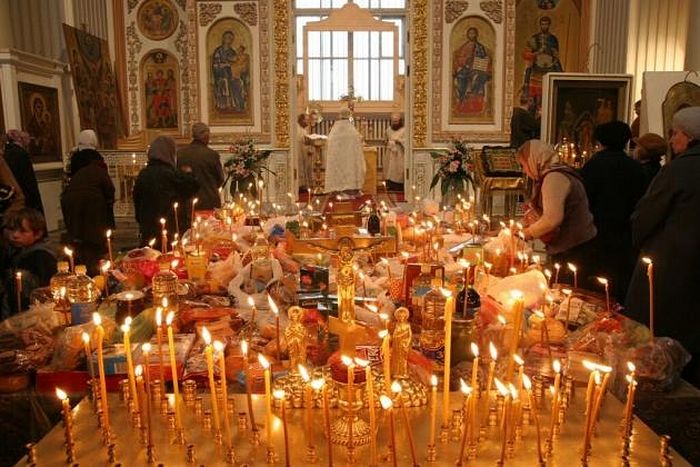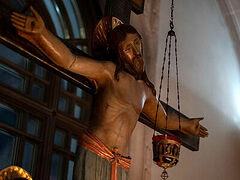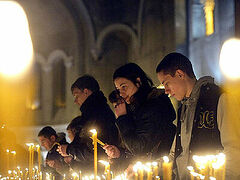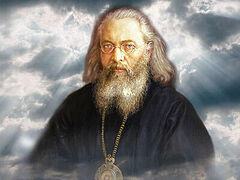Before Meatfare Sunday, the Sunday of the Last Judgment, the Holy Church has established a universal Ancestors' Meatfare Saturday, on which we perform memorial services for all Orthodox Christians who have fallen asleep from the beginning until now. Therefore, it is called universal. This year (the date is movable and depends on Pascha) the commemoration falls on March 9. There are three such universal commemorations in the Orthodox Church year: the above-mentioned Saturday; Radonitsa, celebrated on Tuesday of the second week after Pascha, when we share the joy of the Risen Lord with our departed loved ones; Trinity Ancestors’ Saturday, on which we remember the departed, because the day of Pentecost is the birthday of the Church. We commemorate all members of the Church, both earthly and Heavenly, as a single living body—the Body of Christ, united by Him and having Him as the Head. The entirety of the Church includes the reposed; it is us, the living, and the saints. After all, the Sunday after the feast of the Holy Trinity is All Saints’ Sunday. And the following Sunday is a national commemoration day in our land—Sunday of All Saints who shone forth in the Russian land.
In addition, there are other memorial services, the institution of which is associated with specific historical factors. St. Demetrius Ancestors’ Saturday is associated with the events of the Battle of Kulikovo, in which a great many Orthodox Slavs were killed. It is called St. Demetrius Saturday, because it is connected with the subsequent feast of Holy Great-Martyr Demetrius of Thessalonica, a patron-saint of warriors. Or, for example, memorial services on the feast of the Synaxis of the New Martyrs and Confessors of the Russian Church for the repose of all Orthodox Christians who suffered for the faith of Christ during the Soviet-era persecutions or were victims of political repressions. There are other days of special commemorations of the departed as well—for example, some Lenten Saturdays.
There are also the usual commemorations at the Liturgy, commemorations at forty Liturgies that people order, the reading of the “perpetual Psalter”, general memorial services (Panikhidas), litias or services of need (at people’s request)—the funeral service of the deceased, as well as memorial services and litias.
Saturday is the usual day of commemoration of the departed. This tradition goes back to the Old Testament, since Saturday is a day of rest, and the departed have already found rest in the Lord.
But why do we commemorate all Orthodox Christians who have fallen asleep from the beginning until now, precisely the day before the Sunday of the Last Judgment?
The answer to this question is given in the Synaxarion (from the Greek: “collection”; in this case, a collection of instructions for preparing Christians for Lent) for Meatfare Saturday: “On this day the Holy Fathers established the commemoration of all people who have died from the beginning in piety for the following reason.
“Since many have died suddenly on journeys, in the sea or in impassable mountains, in turbulent streams, in precipices, from illnesses and hunger, in fire, in ice, in war, from cold or from some other cause, funeral services were not performed over them, or over the poor and the wretched. The Holy Fathers, driven by love for mankind, ruled that the universal Church must have a day of universal commemoration of all the departed, adopting this from the Holy Apostles, to pray for those who for whatever reason were not commemorated as established, showing that this (Church commemoration) brings them great benefit. This is how the Church of God commemorates all the souls (all those who have fallen asleep) simultaneously. [There is no Church commemoration of suicides.—Auth.]
“Besides, since the Second Coming of Christ is remembered on this day, it is appropriate to commemorate the memory of the souls (of all those who once lived), imploring the Terrible and impartial Judge to show them mercy and grant them the promised bliss.
“Wishing to expound upon Adam’s expulsion from the Garden of Eden next week, the Holy Fathers first of all think about individual repose, so that having finished today with the final repose that concludes history, they can then start as if from the beginning (from Adam), and with that last trial with the incorruptible Judge, which will be at the end of time, striking fear in people in order to encourage them in their labors of fasting.
“On Saturday, we always remember the souls (of the departed), because Saturday (Sabbath) means rest for the Jews. And we perform prayers on the day of rest for the departed as for those who have found rest from everyday cares and all other cares. There is an established tradition to do this every Saturday, and on this the universal commemoration, to pray conciliarly, remembering all Orthodox.”
Why is it so important for us, the living, to pray for the departed? After all, their destinies are almost decided. There is no repentance for a person after death, and he cannot change his destiny, for the Lord said, “In whatsoever things I shall take thee, in these I shall judge thee.” Such people only await a reward for good deeds or retribution for bad ones in earthly life—for getting closer to God or moving away from Him, depending on their will.
But the Church and the Holy Fathers teach almost unanimously that through the prayers of the earthly Church—bishops, clergy and the kin of the departed—the Lord grants them His special grace, improving their fate in the afterlife. Moreover, prior to the Last Judgment, the destinies of the reposed have not yet been fully determined. Only after the Second Coming of Christ will both eternal torment in hell and eternal bliss in Paradise be completely determined. Before that, we can pray fervently for the repose of our departed relatives. And with our love embodied in prayer—be it in church or at home—with works of mercy performed for them, we can greatly help them by the grace of God and even have them delivered from eternal torment.
Here is an example from the above-mentioned Synaxarion: “Dionysius the Areopagite also speaks of how beneficial it is to commemorate the souls of the departed. This is confirmed by many others, and by the story of St. Macarius the Great, who having found the skull of a pagan, asked him: ‘Do those in hell have any consolation?’ And the skull replied, ‘They have great relief when you, father, pray for the departed.’ St. Macarius the Great prayed to the Lord for a long time, and wanted to know if it was of any use to the departed. St. Gregory the Dialogist delivered Emperor Trajan from hell through his prayers, although he then heard God command him never to pray for the impious again. Even Theophilus the Iconoclast was delivered from torment by the Righteous Empress Theodora and saved by the prayers of holy men and confessors. And St. Gregory the Theologian mentions in the “Oration for his Brother St. Caesareus” alms for the departed as a good deed.
“The great St. John Chrysostom says in his homily on the Epistle to the Philippians: ‘Let us assist them according to our power; let us think of some assistance for them, however small it may be, yet let us assist them… by praying and entreating others to make prayers for them, by continually giving to the poor on their behalf… Not in vain did the Apostles order that remembrance should be made of the dead in the dread Mysteries. They knew that it brings them great gain and benefit, for when the whole congregation stands with uplifted hands, along with a priestly assembly, and that awesome Sacrifice lies displayed, how can we not prevail with God in our entreaties for them?’”1
Therefore, dear brothers and sisters, the Mother Church does not call on us to take the passive position of the grieving and despondent, but the active position of Orthodox Christians, whose love is expressed by concrete deeds—commemorations at the Liturgy, for forty Liturgies that we order, the “perpetual Psalter”, memorial services (Panikhidas), litias, private prayers at home and almsgiving that will help our reposed close ones find eternal rest, as is rightly sung in memorial hymns, “in a place of brightness, a place of green pasture, a place of rest...”
Are you sick at heart and grieving for your reposed loved one? Don’t sit idly by and get discouraged—take the Psalter in your hands, read kathisma 17 or several other kathismas, the canon for the departed, and other memorial prayers. And you will not only do him much good, but with God’s help you will get rid of your own despondency.
As the eleventh and twelfth parts of the Creed proclaim, I look for the resurrection of the dead, and the life of the age to come. Amen.” Not this age, but the age to come. And God is not the God of the dead, but of the living (Mt. 22:32).
Let us also recall the final pages of the Holy Bible—chapters 21 and 22 of Revelation: And I saw a new Heaven and a new earth: for the first heaven and the first earth were passed away; and there was no more sea. And I John saw the holy city, new Jerusalem, coming down from God out of Heaven, prepared as a bride adorned for her husband. And I heard a great voice out of Heaven saying, Behold, the tabernacle of God is with men, and He will dwell with them, and they shall be His people, and God Himself shall be with them, and be their God. And God shall wipe away all tears from their eyes; and there shall be no more death, neither sorrow, nor crying, neither shall there be any more pain: for the former things are passed away… And the city had no need of the sun, neither of the moon, to shine in it: for the glory of God did lighten it, and the Lamb is the light thereof. And the nations of them which are saved shall walk in the light of it: and the kings of the earth do bring their glory and honour into it (Rev. 21:1–4, 23, 24).
That’s what we’re waiting for. Only we ourselves must labor, and labor for our reposed loved ones with God’s help.
I would like to conclude with the words of the holy Apostle John the Theologian: He which testifieth these things saith, Surely I come quickly. Amen. Even so, come, Lord Jesus (Rev. 22:20).





These words are familiar to us in the commonly used variation: "In whatever I encounter you, in that I will judge you." These words are not found in the Gospel but are encountered in the early Christian literature of the time. In a Syriac manuscript, we read that Jesus said, "In whatever they find you, in that they will take you" (Liber Graduum 3.3; 15.4 and others)." So, this is not a biblical quote, but is generally accepted as being spoken by Jesus Christ.
Most likely, these are the authentic words of Christ. They emphasize the importance of living morally and in a Christian manner throughout one's life. And it's not just about the sudden Second Coming. Disasters, accidents, terrorist acts engulf us daily, like a fishing net, and transport us from this world to another. And there – face to face with the Lord. And there will be no opportunity to correct or replay anything...